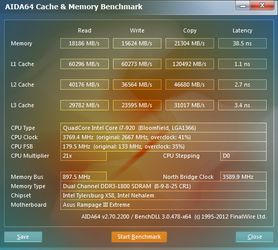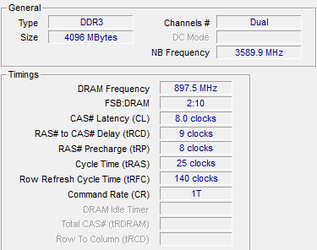Hi, for the first time ever I am really trying to get as much out of my memory as possible. I have Geil Evo Corsa Quad Channel Kit 1866 9-10-9-28.
I split the kit up and put 2 sticks in my i5 2500k and 2 sticks in my i7-920.
Right now we are working with the i7-920 D0.
I was able to get the memory to run at 1800MHz with timings of 8-9-8-25 1N currently the QPI is at 1.375v and the ram is at 1.62975v (settings not actual after droop). The BCLK is 179MHz and my CPU is at a multi of 21x. So I am rocking 3769MHz at 1.257v (from CPU-Z).
Anyways my question is as follows. I read several ram overclocking guides and one of the things I cam accross is the explination that your tRAS should be set as a total of your first 3 timings added together. So that is what I have it set at.
The thing is I commonly see people running the tRAS a few points below that number for example if someone had 7-7-7 instead of 21 they may be at 19. Or if they had 10-11-10 instead of 31 they may be at 28.
How much of an effect does this number have and should I try lowering it? Are there any other timings that are important that I should mess around with?
Also I am not sure I need that much QPI or DRAM V. I know that I am fully stable now (24HRs of prime, several hours of aida, several hours of intel, and several hours of memtest.) Any increase in BCLK I freeze up because I would need to add more CPU voltage so I know that is set as low as it can go.
I will start reducing my QPI little by little till it starts to become unstable and will do the same with the ram.
THanks
Also remember this is a x58 chipset on a RIIIE board. I am only using it in dual channel not tripple as the change in performance seemed minimal.


CPU-Z

I split the kit up and put 2 sticks in my i5 2500k and 2 sticks in my i7-920.
Right now we are working with the i7-920 D0.
I was able to get the memory to run at 1800MHz with timings of 8-9-8-25 1N currently the QPI is at 1.375v and the ram is at 1.62975v (settings not actual after droop). The BCLK is 179MHz and my CPU is at a multi of 21x. So I am rocking 3769MHz at 1.257v (from CPU-Z).
Anyways my question is as follows. I read several ram overclocking guides and one of the things I cam accross is the explination that your tRAS should be set as a total of your first 3 timings added together. So that is what I have it set at.
The thing is I commonly see people running the tRAS a few points below that number for example if someone had 7-7-7 instead of 21 they may be at 19. Or if they had 10-11-10 instead of 31 they may be at 28.
How much of an effect does this number have and should I try lowering it? Are there any other timings that are important that I should mess around with?
Also I am not sure I need that much QPI or DRAM V. I know that I am fully stable now (24HRs of prime, several hours of aida, several hours of intel, and several hours of memtest.) Any increase in BCLK I freeze up because I would need to add more CPU voltage so I know that is set as low as it can go.
I will start reducing my QPI little by little till it starts to become unstable and will do the same with the ram.
THanks
Also remember this is a x58 chipset on a RIIIE board. I am only using it in dual channel not tripple as the change in performance seemed minimal.


CPU-Z

Last edited: